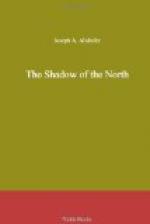“I can tell it now. I don’t mind the snow. I saw from a distance the great fire last night, when the camp of the French and Indians burned. It was clever to destroy their huts and lodges, and I knew at once who did it. Such a thing as that could not have happened without you having a hand in it, Dave Willet. I watched to see what the French and Indians would do, and I followed them in their hurried retreat into the north. I hid in the snowy bushes, and heard some of their talk, too. They will not stop until they reach a village a full hundred miles from here. The Frenchmen, De Courcelles and Jumonville are mad with anger and disappointment, and so is the Indian chief Tandakora.”
“And well they may be!” jubilantly exclaimed Captain Colden, off whose mind a great weight seemed to have slid. “It was splendid tactics to burn their home over their heads. I wouldn’t have thought of it myself, but since others have thought of it, and, it has succeeded so admirably, we can now do the work we were sent here to do.”
Tayoga and Willet made snow-shoes and went out on them a few days later, confirming the report of Black Rifle. Then small parties were sent forth to search the forest for settlers and their families. Robert had a large share in this work, and sometimes he looked upon terrible things. In more than one place, torch and tomahawk had already done their dreadful work, but in others they found the people alive and well, still clinging to their homes. It was often difficult, even in the face of imminent danger, to persuade them to leave, and when they finally went, under mild compulsion, it was with the resolve to return to their log cabins in the spring.
Fort Refuge now deserved its name. There were many axes, with plenty of strong and skillful arms to wield them, and new buildings were erected within the palisade, the smoke rising from a half dozen chimneys. They were rude structures, but the people who occupied them, used all their lives to hardships, did not ask much, and they seemed snug and comfortable enough to them. Fires always blazed on the broad stone hearths and the voices of children were heard within the log walls. The hands of women furnished the rooms, and made new clothes of deerskin.
The note of life at Fort Refuge was comfort and good cheer. They felt that they could hold the little fortress against any force that might come. The hunters, Willet, Tayoga and Black Rifle at their head, brought in an abundance of game. There was no ill health. The little children grew mightily, and, thus thrown together in a group, they had the happiest time they had ever known. Robert was their hero. No other could tell such glorious tales. He had read fairy stories at Albany, and he not only brought them all from the store of his memory but he embroidered and enlarged them. He had a manner with him, too. His musical, golden voice, his vivid eyes and his intense earnestness of tone, the same that had impressed so greatly the fifty sachems in the vale of Onondaga, carried conviction. If one telling a tale believed in it so thoroughly himself then those who heard it must believe in it too.




